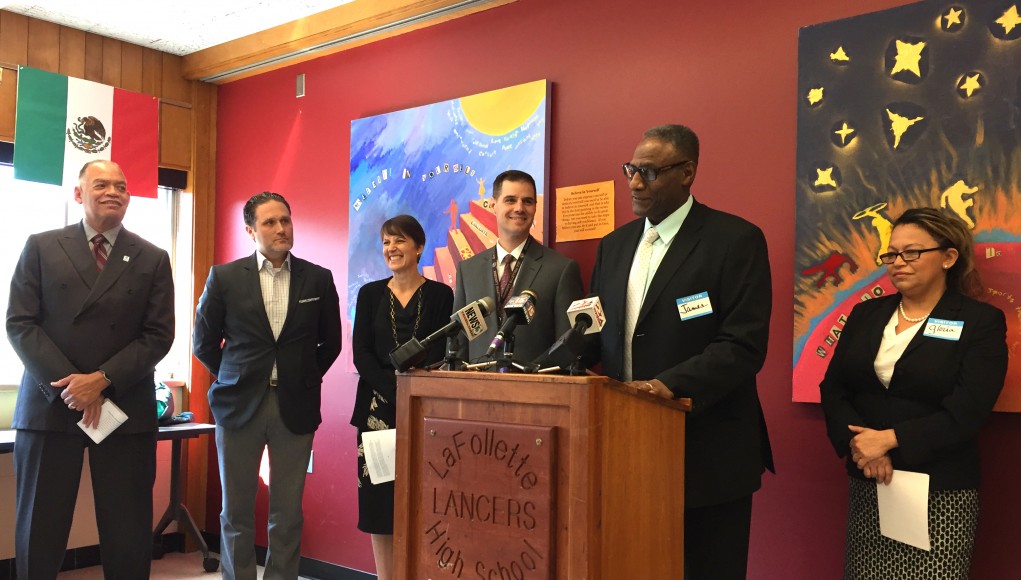“It’s important for students to have the opportunities in their education to succeed and to have a plan for their future,” said Madison Metropolitan School District Board of Education President James Howard. “Personalized pathways is a huge part of that plan. We’re grateful to the many community partners that we have, and to families, teachers. As a [School] Board we are committed to continue to guide this process.”
The Madison School District, together with Madison College, the Workforce Development Board of South Central Wisconsin, the Greater Madison Chamber of Commerce and the City of Madison, announced at a press conference at La Follette High School today that the partnership has been awarded a $400,000 grant from the Joyce Foundation for the creation of personalized pathways to graduation in high schools.
The school district is working with partners to develop a model for personalized pathways in Madison which will give students the chance to explore potential college and career options through their high school experience. Pathways will be student driven, developed together with individual school communities and will give students more opportunities to attain college credit while in high school as well as opportunities to learn about career options through things like job shadowing and internships.

“As a school district, I think everybody knows that we are on a mission to close the gaps in opportunity that leads to gaps in student achievement,” said MMSD Superintendent Jennifer Cheatham. “We want every student not only ready to graduate but to graduate ready for a college career and full participation in our community.”
Cheatham said that graduation rates are moving in the right direction but that “we need to make more progress for all students, especially for our students of color.” She added that too many students don’t graduate because they are not engaged and because they can’t picture their future options.
“Through implementation of our plan, every high school student will have the opportunity to engage in integrated, challenging and thematic coursework aligned to a career cluster with personalized supports. Personalized pathways in our high schools can provide all of our students with opportunities to explore who they are and what they are passionate about through their learning,” Cheatham said. “Through this grant and the work of our school communities and partners, we will be able to develop pathways that put students in the driver’s seat and help them graduate with multiple options for their future. We believe that this work has tremendous potential to close opportunity gaps for our students.”

La Follette High School Principal Sean Storch said that they are always trying to work hard to ensure all students have supports to achieve excellence. “Personalized pathways is one of those models for us to use to provide more individualized supports for our kids,” he said. “We want them to be able to explore career possibilities and learn about things they are passionate about and ultimately graduate with multiple opportunities in their future.”
Madison College President Jack Daniels said that these pathways are tremendously important because it gears students towards workplace types of positions that are going to be critical to the future of our city and state. “As we continue to move forward, we look forward to working collaborative with faculty on both sides of the equation and working with the Workforce Development Board of South Central Wisconsin and working with the [Madison] Chamber [of Commerce] as well,” Daniels said.
Together with partners, the district is continuing the planning process with the goal of launching the first pathway in the 2017-18 school year. The Joyce Foundation grant will support the planning process going forward.

Greater Madison Chamber of Commerce President Zach Brandon said that a fundamental concept of economics is that economies work when resources align. “This concept of supply and demand is the bedrock of our local economy and the market economy in general,” he said. “No scarcity, no gaps … that’s how you have a well-oiled machine.
“About three years ago, two new educational leaders came to Madison with new ideas. They were unwilling to accept the status quo and the norm,” Brandon added. “Dr. Jen Cheatham and Dr. Jack Daniels both came here with a challenge in their heart and in their minds about making a difference. It ignited the imagination of the business community and the business community started to asks itself, ‘what if?’”
Brandon said that in business you have “incremental innovation” and you have “disruptive innovation.”
“Disruptive innovation is the kind of innovation that moves the status quo. The incumbent is no longer in the pole position,” he said. “I feel like that is what we’re here to do. We’re here to say that the status quo that we accepted before is no longer acceptable to us.”
Workforce Development Board of South Central Wisconsin Executive Director Pat Schramm said that we need to face the fact that Dane County is projected to be the driver area for the entire state of Wisconsin by 2037.
“The reason the Workforce Development Board is involved in this is because we are laser-focused on talent development for our region,” she said. “The students who are part of the Madison Metropolitan School District and the future students are going to be the whole economic engine for the entire state of Wisconsin and it’s absolutely essential that they are educated to the highest level that we can possibly invest in and that they understand all of the opportunities that are before them.”










